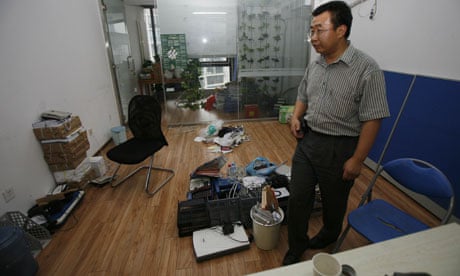China has launched the most severe crackdown on dissidents and activists for more than a decade, human rights campaigners have warned.
At least 23 people have been detained, mostly in relation to charges of incitement to subversion or creating a disturbance; three more have been formally arrested; and a dozen people are missing, including several prominent human rights lawyers. Rights groups say they are increasingly concerned that those who have vanished may be at physical risk.
The move follows anonymous online calls for "jasmine revolution" protests, echoing the uprisings in the Middle East. Although the posting was on an overseas website, and there was little sign of domestic support for the appeal, officials began detaining and harassing people within hours of its appearance.
"I think the crackdown is partly to find out who is behind it," said Wang Songlian of the Chinese Human Rights Defenders network, which has been monitoring the detentions. It believes about 200 more people had their movements controlled for shorter periods.
Wang added: "But part of it is an opportunity to retaliate against certain people … The terror of this current crackdown is that it is very difficult to know whether you are going to be next. That in itself is very unsettling for activists."
The group is one of several to describe the campaign as the harshest since 1998, when the government imprisoned around two dozen activists for organising the China Democracy political party, although some argue that the troubled regions of Xinjiang and Tibet have seen equally sweeping "anti-separatist" drives in the interim.
Many of the latest detainees appear to have been targeted for publicly criticising the authorities on Twitter or other online services, or have a history of rights activism.
Although three men in Sichuan have been formally arrested for incitement to subversion – well-known blogger Ran Yunfei, Chen Wei and Ding Mao – the greatest concern is for those who have simply disappeared. In several cases, they were last seen being taken away by police.
"We are worried and can't eat well or sleep properly each night. They are doing good deeds for people; why should they be taken away?" said Pang Jinhua, mother-in-law of lawyer Teng Biao, who has been missing since mid-February.
Jiang Tianyong's wife, Jin Bianling, said police told her they did not know his whereabouts, while Chinese Human Rights Defenders reported that Tang Jitian is now thought to be held in "soft detention" in his hometown in Jilin.
Other lawyers missing are Li Tiantian of Shanghai and Liu Shihui from Guangzhou. The latter vanished shortly after telling the Guardian he had been hooded and beaten on his way to a demonstration. Another Guangzhou lawyer, Tang Jingling, may also be missing.
Their friends and supporters are increasingly fearful that they may face long prison terms or lengthy illegal detentions and even physical abuse. Chinese law states that police must inform an individual's relatives or place of work within 24 hours of detention, unless there is no way to do so or it would "impede the investigation".
Joshua Rosenzweig of the Dui Hua foundation, which supports political prisoners, said that the China Democracy party activists had at least gone through a judicial process, however flawed.
"One of the things disturbing about this latest crackdown is how apparently routine it has become for security agents to essentially ignore the legal procedures in their treatment of activists," he said.
He added: "The possibility of torture – whether in reality or in suspicion – is a bigger deterrent and much more chilling than jail … [People] wonder if they are next on the list."
Nicholas Bequelin, an Asia researcher for Human Rights Watch, warned: "We are very apprehensive about the risk of torture and ill-treatment.
"We are seeing the government trying to roll back the space that has opened up in the last 10 years, particularly in terms of the assertion of rights.
"It's an effort to instil fear for internet users so they exercise self-censorship. It's also an attempt to decapitate civil society by taking away its most visible figures."
Many usually outspoken government critics have become reluctant to speak to diplomats, journalists or other foreign contacts.
Police did not respond to faxed questions about the missing lawyers. Asked about concerns for their whereabouts and physical safety, a foreign ministry spokeswoman, Jiang Yu, told a regular press briefing: "China's judicial authorities work independently.
"China, as a country under the rule of law, protects its citizens' basic rights and freedoms – including freedom of expression – but citizens while exercising their rights have an obligation to abide by the law and should not bring harm to the public interest."
Earlier this week China dismissed a call from a UN rights agency to free human rights lawyer Gao Zhisheng, who has not been seen for almost a year and is thought to have been detained for two years.
There is also concern for the whereabouts of Australian novelist and writer Yang Hengjun.
